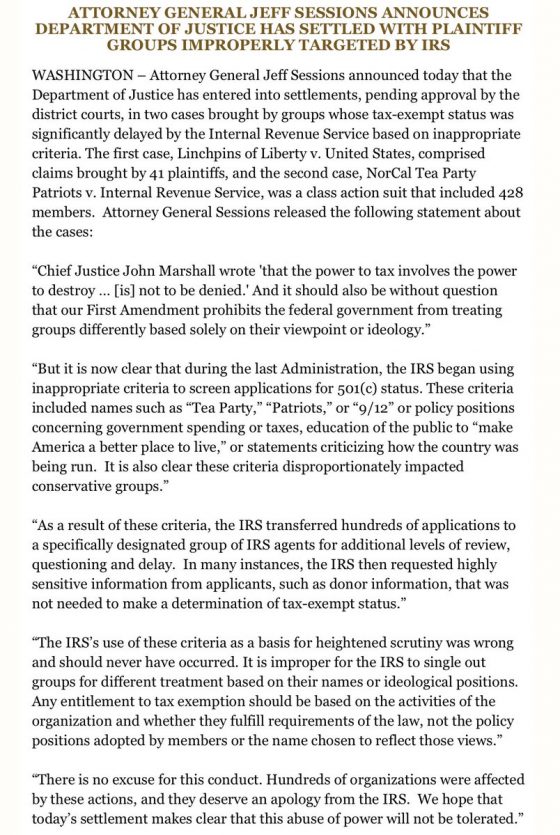By: Denise Simon | Founders Code
DC: President Trump made it official on Thursday that embattled IRS Commissioner John Koskinen will be out of a job next month.
Trump tapped David Kautter, the Treasury Department’s assistant secretary for tax policy, to serve as interim IRS commissioner, beginning Nov. 13.
Koskinen’s term ends on Nov. 12. He was eligible for reappointment, but Koskinen is fiercely opposed by congressional Republicans. Members of the House Freedom Caucus attempted but failed to impeach Koskinen last year, largely over his handling of the scandal involving former IRS official Lois Lerner.
Prior to Koskinen’s tenure, Lerner was accused targeting conservative groups who applied for non-profit status. Koskinen was accused of stonewalling congressional investigators looking into Lerner’s activities as well as of covering up for the Obama administration.
Trump had faced pressure from many Republicans to fire Koskinen, who was appointed to head the IRS by President Obama in 2013.
Kautter, Koskinen’s intended replacement, was appointed to his role at Treasury in August. He worked as a tax attorney at the firm Ernst & Young for more than three decades.
Kautter will still perform his Treasury Department duties while overseeing the IRS, according to Treasury Sec. Steven Mnuchin.
“David will provide important leadership while we wait to confirm a permanent commissioner,” Mnuchin said in a statement, according to Bloomberg.
***
There are still some parts to the cases outstanding.
Mr. Greim and his team managed to depose former senior IRS executive Lois G. Lerner during the four years his case ran, but those transcripts remain sealed along with records of the deposition of another employee, Holly Paz. The two women have told a judge they fear for their safety if their testimony is released.
But on Wednesday the Cincinnati Enquirer asked the court to make those records public, as well as unredacted court documents that refer to the testimony.
The settlements end two separate lawsuits covering more than 450 groups identified by the IRS as having been snared in the targeting.
The vast majority of them are conservative-leaning groups which began to see long delays, intrusive questioning and other illegal scrutiny when they applied for tax-exempt status as either 501(c)(3) or 501(c)(4) organizations beginning in 2009.
In the new filings the singled out Ms. Lerner for particular blame in the scheme, saying she “failed” to stop the targeting going on by her employees, and further failed to alert higher-ups at headquarters in Washington — where she also worked — of the problems.
That’s a major shift from before, where the Justice Department — far from blaming Ms. Lerner — actually credited her with being a hero, saying she tried to stop the targeting when she became aware of it.
A lawyer for Ms. Lerner didn’t return an email for comment sent late Wednesday.
Tom Zawistowski, head of the Portage County TEA Party in Ohio, said Ms. Lerner should have faced criminal charges for her role, which court documents filed earlier in the case show involved her trying to shield the activity by changing names, but overall approving and in fact intensifying the scrutiny the conservative groups were given.
He said he still wants to see a special counsel appointed at the Justice Department to pursue the case and get to the bottom of the motive behind the targeting.
Despite initial claims by some Republicans, no evidence has ever traced the targeting back to Mr. Obama or his top political aides.
But emails released this year show the IRS was made aware by its own agents that it was singling out groups based on their politics, not on questions about their tax behavior.
“These cases are held back primarily because of their political party affiliation rather than specifically any political activities,” Elizabeth C. Kastenberg, an official in the agency’s Exempt Organizations division, wrote in an April 1, 2011, email to other IRS employees, including her supervisor.
That contradicts the IRS’s long-stated position that Ms. Lerner and others involved in the targeting were worried in the wake of a 2010 Supreme Court decision about a surge of groups going beyond the usual rules of politics. More here.



















